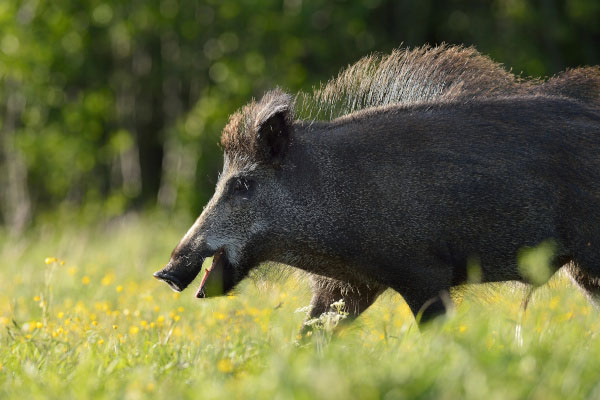
The New Hampshire House of Representatives is set to vote on a bill that could increase property taxes for private hunting preserves in the Granite State. The bill has not received a lot of attention, but it ties together the diverse challenges of invasive species, property tax rates, open space preservation and funding for the Fish and Game Department.
House Bill 467 would exclude some hunting preserves from “current use.”
New Hampshire’s current use program allows undeveloped land over 10 acres to be taxed at a lower property tax rate. There can be no houses, septic tanks or other construction on the 10 acres, but timberland and farmland may qualify. Landowners get an extra discount if they allow public recreation on their land.
Some detractors argue the current use program creates an unfair property tax burden for low-income homeowners with small lots. Supporters of current use argue it protects the rural character of New Hampshire because it creates an incentive to preserve wild, open space in the Granite State.
Over half of New Hampshire’s land is in current use.
Corbin Park
HB 467 would specifically exclude property from current use if the land is “used to harbor non-native, non-domesticated animal species.” According to the bill sponsors, this change is targeted at Corbin Park, a massive and secretive private hunting preserve in Croydon, in western New Hampshire.
Officially called the Blue Mountain Forest Association, Corbin Park, depending on which report you read, is anywhere from 19,000 to 26,000 acres — one of the largest in the United States. Banking millionaire Austin Corbin created the park in the late 1800s and stocked the preserve with exotic species, from Himalayan mountain goats to bison.
Corbin Park has a long and storied history, including alleged visits from Rudyard Kipling, Teddy Roosevelt and Joe DiMaggio. The membership is very exclusive, somewhere from 20 to 30 total, with an annual membership fee of five or six figures. Once again, the exact details are private.

In the past two decades, Corbin Park has captured the attention of state legislators concerned about invasive species. Eurasian boar, in particular, are known to escape the park grounds. The wild pigs can do significant damage to habitats and crops, and they out-compete native species for food. Wild boar are also speedy and abundant breeders, which makes it harder to control their population.
The owners of Corbin Park allow locals to hunt and kill any wild pigs found outside the preserve.
Arguments for HB 467
Supporters of HB 467 believe the state’s current use law is not intended to protect private landowners raising exotic animals for sport. They argue Corbin Park is damaging the environment by introducing invasive species, so they should not get a property tax break.
The guests at Corbin Park also do not have to buy a hunting license to shoot the wild pigs and elk owned by the park. That means they do not contribute directly to the Fish and Game Department, which still has some responsibility to oversee the land and manage New Hampshire’s wildlife.
Supporters of HB 467 conclude that these wealthy hunters are not paying their fair share in taxes.
Arguments against HB 467
Opponents of HB 467 defend Corbin Park and criticize any changes to the current use program.
Corbin Park may have some problems securing its wild boar, but it still preserves a huge area for native New Hampshire wildlife. Corbin Park can also generate tourist income for the area when visitors spend money at nearby hotels and restaurants.
Changing the current use law to target Corbin Park could also have negative impacts on other businesses and outdoor recreation. For example, New Hampshire is home to several private hunting preserves that raise pheasants or other non-native game birds. These preserves might be forced to sell their open land to private developers if they cannot keep their land in current use.
Lastly, any additional property tax dollars raised through HB 467 would not go to the Fish and Game Department for wildlife management. Property taxes primarily go to towns and the state for school funding.
What’s next?
The House Municipal and County Government committee voted 17-2 to recommend the full House kill HB 467.
Without changing the wording, most legislators on the committee were concerned the bill would have broad unintentional effects on other hunting preserves or maybe even some farms.
The full House is next scheduled to meet April 7, 8 and 9.
This article is being shared by partners in The Granite State News Collaborative. For more information visit collaborativenh.org.